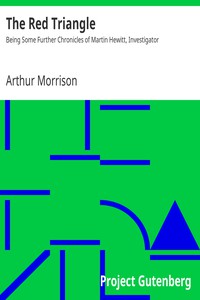Martin Hewitt, Investigator by Arthur Morrison (reading in the dark TXT) 📗

- Author: Arthur Morrison
Book online «Martin Hewitt, Investigator by Arthur Morrison (reading in the dark TXT) 📗». Author Arthur Morrison
"As to the writing on the paper," Nettings interposed, "I've told you how I made that mistake. I took the readiest explanation of the words, since they seemed so pat, and I wouldn't let anything else outweigh that. As to the other things—the evidences of Rameau's having gone off by himself—well, I don't usually miss such obvious things; but I never thought of the possibility of the victim going away on the quiet and not coming back, as though he'd done something wrong. Comes of starting with a set of fixed notions."
"Well," answered Hewitt, "I fancy you must have been rather 'out of form,' as they say; everybody has his stupid days, and you can't keep up to concert pitch forever. To return to the case. The evidence of the chopper was very untrustworthy, especially when I had heard of Goujon's careless habits—losing shovels and leaving coal-scuttles on stairs. Nothing more likely than for the chopper to be left lying about, and a criminal who had calculated his chances would know the advantage to himself of using a weapon that belonged to the place, and leaving it behind to divert suspicion. It is quite possible, by the way, that the man who attacked Rameau got away down the coal-lift and out by an adjoining basement, just as did Rameau himself; this, however, is mere conjecture. The would-be murderer had plainly prepared for the crime: witness the previous preparation of the paper declaring his revenge, an indication of his pride at having run his enemy to earth at such a distant place as this—although I expect he was only in England by chance, for Haytians are not a persistently energetic race. In regard to the use of small instead of capital letters in the words 'La Tortue' on the paper, I observed, in the beginning, that the first letter of the whole sentence—the 'p' in 'puni'—was a small one. Clearly, the writer was an illiterate man, and it was at once plain that he may have made the same mistake with ensuing words.
"On the whole, it was plain that everybody had begun with a too ready disposition to assume that Goujon was guilty. Everybody insisted, too, that the body had been carried away—which was true, of course, although not in the sense intended—so I didn't trouble to contradict, or to say more than that I guessed who had carried the body off. And, to tell you the truth, I was a little piqued at Mr. Styles' manner, and indisposed, interested in the case as I was, to give away my theories too freely.
"The rest of the job was not very difficult. I found out the cabman who had taken Rameau away—you can always get readier help from cabbies if you go as one of themselves, especially if you are after a bilker—and from him got a sufficiently near East End direction to find Rameau after inquiries. I ventured, by the way, on a rather long shot. I described my man to the cabman as having an injured arm or wrist—and it turned out a correct guess. You see, a man making an attack with a chopper is pretty certain to make more than a single blow, and as there appeared to have been only a single wound on the head, it seemed probable that another had fallen somewhere else—almost certainly on the arm, as it would be raised to defend the head. At Limehouse I found he had had his head and wrist attended to at a local medico's, and a big nigger in a fright, with a long black coat, a broken head, and a lame hand, is not so difficult to find in a small area. How I persuaded him up here you know already; I think I frightened him a little, too, by explaining how easily I had tracked him, and giving him a hint that others might do the same. He is in a great funk. He seems to have quite lost faith in England as a safe asylum."
The police failed to catch Rameau's assailant—chiefly because Rameau could not be got to give a proper description of him, nor to do anything except get out of the country in a hurry. In truth, he was glad to be quit of the matter with nothing worse than his broken head. Little Goujon made a wild storm about his arrest, and before he did go to France managed to extract twenty pounds from Rameau by way of compensation, in spite of the absence of any strictly legal claim against his old tormentor. So that, on the whole, Goujon was about the only person who derived any particular profit from the tortoise mystery.
THE END. End of Project Gutenberg's Martin Hewitt, Investigator, by Arthur Morrison





Comments (0)